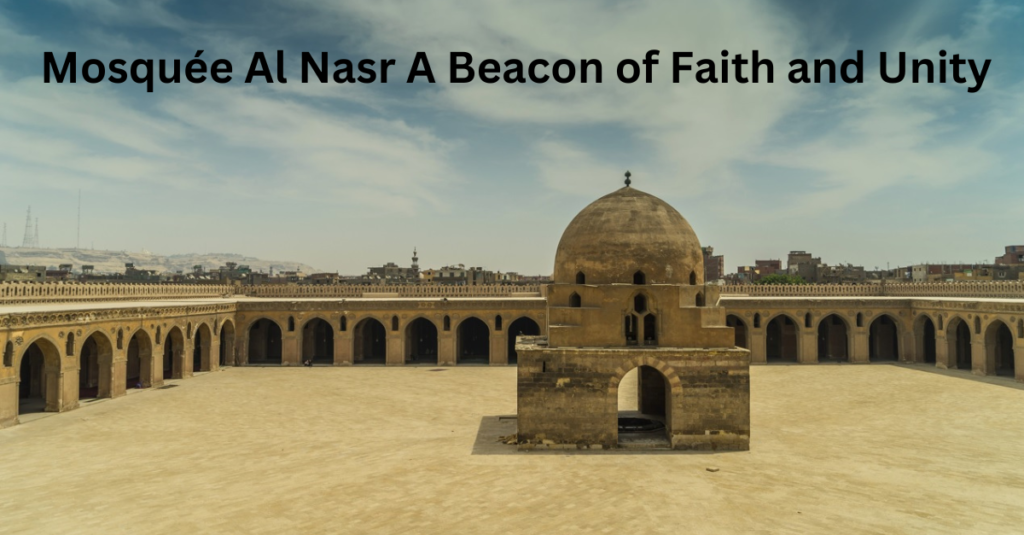Nestled in the coronary heart of Tunis, the capital city of Tunisia, the Mosquée Al Nasr is a monumental symbol of Islamic background and cultural team spirit. This mosque is not only a place of worship, but a community center, an ancient monument and an architectural wonder. In this article we will explore the significance of the Mosquée Al Nasr, its history, architecture and the role it plays in the lives of people in Tunis.
Historical Significance
Mosquée Al Nasr, which translates to “Victory Mosque”, has a rich record dating back to its establishment in the early twentieth century. The mosque was built at a certain stage in the period of national awakening and revival in Tunisia. As the United States struggled to articulate its identification and cultural historical past, the status quo of mosques like Al Nasr played a vital role in fostering a sense of cohesion and contentment among some Tunisians.
The mosque was built in response to the growing need for a larger worship area to cope with the growing Muslim population in Tunis. It became anticipated as a symbol of victory and electricity, reflecting the aspirations of the Tunisian people at a time of considerable social and political change. Over the decades, Mosquée Al Nasr has witnessed several historic occasions and has been a silent observer of the country’s journey through colonial rule, independence and modernity.
An Architectural Marvel
One of the maximum possibilities of the location of Mosquée Al Nasr is its architectural magnificence. The mosque is a beautiful example of an Islamic structure that mixes conventional design elements with contemporary effects. The mosque’s exterior is decorated with intricate geometric patterns and calligraphy that showcase the fantastic craftsmanship of Tunisian artisans.
The mosque’s minaret, a towering shape that can be seen from afar, is a distinctive feature that lends its majestic presence. The minaret is not only a visual dominant, but also fulfils a practical purpose, calling the faithful to prayer five times a day. The design of the minaret is a harmonious combination of ancient and modern styles, making it a completely unique architectural detail within the city skyline.
Inside, the mosque is similarly magnificent. The prayer hall is spacious and skillfully decorated with beautiful chandeliers, ornate carpets and intricately designed mihrabs (prayer alcoves) that indicate the way to Mecca. The use of natural moderates through large windows and skylights creates a calm and peaceful ecosystem that enhances the spiritual experience for worshippers.
Center for Community and Education
Mosquée Al Nasr is more than just an area for spiritual rituals; it serves as a vital networking hub for the people of Tunis. The mosque hosts several sports and events to cater to people of all ages and backgrounds. From religious lessons and lectures to social gatherings and cultural events, the mosque plays a key role in fostering community spirit and cohesion.
One of the important functions of the mosque is to offer non-secular education to the younger era. Quran training and Islamic research are presented to youth and children to ensure they develop with strong knowledge in their religion and background. In addition, the mosque hosts various instructional packages and workshops for adults that cover topics along with theology, ethics, and personal development.
In addition, the mosque acts as a center for social offerings that provide help and assistance to those in need. Charity events, food distribution and clinical camps are some of the initiatives that the mosque management uses to help the less fortunate members of the community. These efforts reflect the mosque’s commitment to the concepts of compassion and harmony, which may be fundamental principles of Islam.
Cultural Significance
In addition to its non-secular and social capabilities, the Mosquée Al Nasr has immense cultural significance for Tunisian human beings. The mosque is a testament to the city’s rich Islamic historical past and serves as a repository of conventional arts and crafts. The intricate tile paintings, wood carvings and calligraphy discovered inside the mosque are a testament to the skill and artistry of Tunisian artisans.
The mosque also plays a key function in preserving and selling the Tunisian way of life. It hosts a number of cultural events and exhibitions that showcase our artistic and cultural background. These events offer a platform for local artists and artisans to showcase their work and help keep traditional crafts alive in the modern age.
In addition, the mosque is a critical landmark for the metropolis’ tourism industry. Visitors from around the arena come to admire its architectural beauty and learn about its historical and cultural significance. The mosque provides guided tours and academic packages for vacationers, enhancing their understanding of the Tunisian lifestyle and Islamic background.
The Role of Mosquée Al Nasr in Contemporary Society
In today’s fast-paced and ever-changing world, the Mosquée Al Nasr plays a key role in the lives of people in Tunis. The mosque serves as a haven where people can find solace and peace amidst the hustle and bustle of urban existence. It provides space for reflection and spiritual rejuvenation, supporting people to reconnect with their faith and values.
The mosque also serves as a platform to promote interfaith dialogue and understanding. In an international environment where religious and cultural differences often lead to war, Mosquée Al Nasr stands as a beacon of tolerance and harmony. Interfaith meetings and discussions are often held at the mosque, where people from a unique non-secular background come together to foster mutual respect and knowledge.
In addition, the mosque is actively involved in solving current social problems. Through numerous applications and tasks, the mosque seeks to address issues involving poverty, illiteracy and social inequality. By carefully dealing with network organizations and groups of authorities, Mosquée Al Nasr seeks to create an extraordinarily inclusive and just society.
Challenges and Prospects for the Future
Despite its many achievements and contributions, Mosquée Al Nasr faces several challenges today. One of the most challenging situations is preserving the mosque’s infrastructure and preserving its ancient and architectural integrity. The management of the mosque is constantly working on stable investments and assets for conservation and restoration projects to make sure that this cultural treasure is preserved for future generations of destiny.
Another challenge is adapting to the changing wants and expectations of the network. As society evolves, the mosque must constantly innovate and expand its services to remain applicable and efficient. This includes adopting new technologies and platforms for verbal exchange to engage with younger technology and reach a much wider target audience.
Looking at destiny, Mosquée Al Nasr is poised to maintain its legacy as a pillar of faith, culture and community. The mosque management is dedicated to maintaining its rich history while embracing modernity and progress. Staying true to its core values and concepts, Mosquée Al Nasr will surely support and uplift the Tunisian people for decades to come.
Conclusion
Mosquée Al Nasr is more than just a mosque; it is by miles a picture of the enduring spirit and resilience of Tunisian human beings. Through its rich records, beautiful structure and multifaceted role in society, the mosque is a testament to the energy of faith and community. The Mosquée Al Nasr will continue to act as a beacon of hope and unity and will continue to be an essential part of Tunisia’s cultural and religious landscape, inspiring generations to come.
FAQs
What is Mosquée Al Nasr?
Mosquée Al Nasr, which means “Victory Mosque,” is a prominent mosque located in Tunis, the capital city of Tunisia. It serves as a place of worship, a community center, and a historical landmark, reflecting the rich Islamic heritage and cultural unity of the Tunisian people.
Where is Mosquée Al Nasr located?
Mosquée Al Nasr is situated in the heart of Tunis, Tunisia. Its exact location within the city can be easily accessed via local transportation, and it is a well-known landmark in the area.
What is the historical significance of Mosquée Al Nasr?
The mosque was built in the early 20th century during a period of national awakening and resurgence in Tunisia. It was constructed to accommodate the growing Muslim population and symbolizes the aspirations and unity of the Tunisian people through significant social and political changes.
What architectural styles are reflected in Mosquée Al Nasr?
Mosquée Al Nasr showcases a blend of traditional Islamic architecture and modern influences. It features intricate geometric patterns, calligraphy, a towering minaret, spacious prayer halls, and elegant interior decorations including chandeliers, carpets, and mihrabs.
What role does Mosquée Al Nasr play in the community?
The mosque serves as a vital community center, hosting religious classes, social gatherings, cultural events, and educational programs. It provides religious education, social services, charity drives, and supports various community initiatives.
Also Read: Hamro Solar LLC Pioneering Sustainable Energy Solutions



